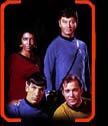 |
 |
GENE RODDENBERRY - CREATOR OF STAR TREK
The more extreme end of the fan spectrum has been known to hail Star
Trek's creator Gene Roddenberry as a great 20th century humanist. But his
detractors accuse him of saddling Star Trek with a slushy moralising
agenda that prevents it from realising its potential as a mature science fiction series.
A larger-than-life, bluff and vivacious man, Roddenberry worked on a
variety of successful TV series in the '50s and '60s such as 'Have Gun Will
Travel' and 'The Lieutenant'. He toyed for years with the idea of producing
an intelligent sci-fi show with an ensemble cast, frequently describing
what was to become Star Trek as 'a Wagon Train to the Stars'.
Roddenberry fought a long campaign to bring Trek to the screen. The
first pilot, 'The Cage', was rejected for being 'too cerebral'. The
second, introducing the crucial Kirk and Spock axis, gave the series the
green light. Yet the original Star Trek only lasted three seasons and it
was only with the help of syndicated repeats that Roddenberry's baby
began to win acclaim beyond an already loyal fan base.
His critics, who tend also to be fans of the more gritty, combative
style of Deep Space Nine, argue that he was responsible for limiting the
scope of the programme and forcing on it a stifling ethical tone. His
supporters respond by saying that it is Star Trek's optimism that has
secured its appeal.
Roddenberry's vision could easily be dismissed as pat, but he did at
least apply it with conviction and consistency. Star Trek was an
extremely political programme for its time. It can be mocked now, but
choosing to have a multi-racial crew (African, Asian, American, Russian,
Scottish and, of course, Vulcan) to represent humanity's progress was
actually a brave decision in the world of '60s US TV. The closest a US
audience had to stimulating sci-fi before Star Trek was the pantomime
romp of 'Lost in Space' and the intelligent but rather dour 'Twilight Zone'.
 Roddenberry has been blamed and lampooned for the sexism of the original
Star Trek. Yet, when compared to other '60s shows, Star Trek comes off
relatively well in this regard. It was NBC who blocked Roddenberry's
wish to have a young Majel Barrett as second-in-command of the
Enterprise, claiming that even by the 24th Century this kind of leap in
gender roles would be too much for sensitive viewers to bear.
Roddenberry eventually redrafted Barrett - his future wife - into the
role of the Spock-smitten Nurse Chapel.
Roddenberry has been blamed and lampooned for the sexism of the original
Star Trek. Yet, when compared to other '60s shows, Star Trek comes off
relatively well in this regard. It was NBC who blocked Roddenberry's
wish to have a young Majel Barrett as second-in-command of the
Enterprise, claiming that even by the 24th Century this kind of leap in
gender roles would be too much for sensitive viewers to bear.
Roddenberry eventually redrafted Barrett - his future wife - into the
role of the Spock-smitten Nurse Chapel.
He saw the Next Generation as a chance to correct some of the original
series' flaws. Thus the captain was no longer automatically beamed down
to dangerous planets, and women were given higher profile roles. And the
saucer section of the ship was now detachable. By and large
Roddenberry's improvements showed maturity, most notably in the casting
of a Shakespearian actor as an unexpectedly intellectual captain and the
brilliant political move of introducing a Klingon to the ship's bridge.
Deep Space Nine, the Maquis and the current bleak and unpredictable state
of Federation politics in the Alpha Quadrant all mark a shift away from
Roddenberry's utopian ideal. Yet the deference to Roddenberry's vision
remains. The film series, Deep Space Nine and Voyager have never truly
broken out of the cast created by Star Trek's originator. When
Roddenberry died in 1992 the fifth season Next Generation two-parter
'Unification' - which fittingly represented the joining of the old and new
Star Treks and the success of his TV franchise - was dedicated to him.
Key Gene Roddenberry Episodes: The Cage (TOS), The Corbomite Maneuver
(TOS) City on the Edge of Forever, (TOS), Mirror, Mirror (TOS),
Encounter at Farpoint (TNG), Unification (TNG).
|
 |
 |
